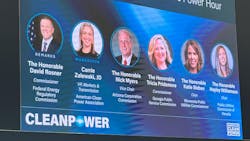FERC’s Rosner, State Utility Commissioners Talk Grid Challenges
The electric grid used to be boring, but not today, said Commissioner David Rosner of the Federal Energy Regulatory Commission (FERC). Rosner and public utility commissioners from Arizona, Georgia, Minnesota and Nevada discussed grid challenges during this summer’s CLEANPOWER conference in Phoenix.
The most obvious grid challenge is increased electricity demand. Rosner cited the North American Electric Reliability Corp.’s (NERC’s) 2024 Long-Term Reliability Assessment, which forecasts a 122-gigawatt increase in summer peak demand during the next decade.
“That’s like adding MISO to the grid,” Rosner said, referencing the Midcontinent Independent System Operator, the grid operator for 15 states in the central U.S. plus Manitoba in Canada.
That’s like adding MISO to the grid.
Because FERC is an independent agency that regulates the interstate transmission of electricity, Rosner said, he and his three fellow commissioners are focused on interconnection reform, transmission planning and bipartisan policy efforts. Rosner mentioned advancements in storage, grid-enhancing technologies and geothermal systems as examples of bipartisan interests.
Panel moderator Carrie Zalewski, vice president of markets and transmission at the American Clean Power Association, said increased demand will require more transmission lines, and those lines need to be built faster.
“Speed is no longer a luxury; it’s a necessity,” Zalewski said. “We need to build things in five years or less.”
Utility commissioners, she said, have one of the toughest jobs in public service.
Data Centers Up Demand in States
Arizona is experiencing an industrial boom, with 80% of load growth coming from data centers and large industrial customers, said Nick Myers, vice chair of the Arizona Corporation Commission.
Myers explained how data centers have shaped his job. These days, he ensures residential customers aren’t unfairly shouldering the cost of infrastructure built to serve data centers.
Down in Georgia, people have more to talk about than Plant Vogtle Units 3 and 4, the first new nuclear reactors built in the U.S. in more than 30 years. The state is establishing minimum 15-year contracts to help data center operators achieve speed to market, said Commissioner Tricia Pridemore of the Georgia Public Service Commission. When given an opportunity to get up and running quickly, data center owners don’t mind paying for it, she said.
“Honey, it’s time to smile,” Pridemore said. “We’re the cool kids, finally.”
Although Plant Vogtle is the largest nuclear power producer in the U.S., Georgia also is on track to become No. 4 in solar power generation, Pridemore said.
Three-Legged Stool: Affordability, Reliability, Clean Energy
Commissioners repeatedly said balancing electricity reliability, affordability and decarbonization is difficult.
“Different states, same stories,” said Hayley Williamson, chair of the Nevada Public Utilities Commission.
Williamson described a PUC commissioner’s role as balancing a “three-legged stool.” Nevada has a statewide natural disaster plan, renewable energy goals and a strong interest in joining a regional transmission organization, she said. Williamson also stressed the importance of visibility and stakeholder involvement in the state’s integrated resource planning (IRP) process, including workshops to achieve buy-in for new transmission.
To the north, Minnesota is juggling investments in renewables, new and existing natural gas plants and a 160-mile transmission line project, said Katie Sieben, chair of the Minnesota Public Utilities Commission.
Most days are good, but some are bad. She said a major project backed by National Grid recently withdrew because of permitting uncertainty. Minnesota recently passed permitting reform, but Sieben said a better way would be to do things faster while allowing for transparency and input from tribes, local communities and labor.
She said having workers show up in hard hats to share how communities can benefit is impactful.
“Labor has been integral to moving infrastructure forward,” Sieben said.
Supply Chain Disruptions Hurt Diversified Resources
Pridemore said supply chain disruptions — especially for solar components — are a growing concern in Georgia. Some delays last as long as 18 months.
“And I need gas,” she said.
Arizona’s Myers said a future without more natural gas infrastructure won’t be good.
“In about three or four years, we’re going to be in a world of hurt if we don’t get more natural gas online,” Myers said.
He included more nuclear to his description of a better future, but adding nuclear generation takes a long time.
His state’s on the right path, though, Myers said. Arizona implemented a wildfire mitigation policy that took much of the liability off utilities. The state also adopted a formula rate approach that’s similar to FERC’s to attract investment and decrease uncertainty.
“Investors are interested in Arizona again because we’ve decreased uncertainty,” Myers said.
His top priority is reliability.
“If the AC goes out in Arizona, people die,” Myers said.
Looking Ahead
The commissioners said they expect new technologies and growing energy demands during their terms.
Pridemore listed artificial intelligence, data centers and next-generation nuclear as her priorities. Myers said expanding pipeline infrastructure and laying the groundwork for new technologies. Sieben warned affordability would remain the Midwest’s greatest challenge, even if growth could help flatten cost curves. Williamson encouraged her fellow commissioners to stay on top of trends and to continue to engage stakeholders.
“You touch everyone’s life,” Williamson said.
About the Author
Kristen Wright
Kristen Wright is an energy journalist with more than 20 years’ experience covering global utilities, petroleum and policy. In 2024, she was appointed as an Energy Innovation Fellow with the U.S. Department of Energy. Reach her at [email protected] and wrightkristenm on LinkedIn. Opinions expressed here are personal and not representative of the positions or policies of the EIF Program, Department of Energy, ORISE or the U.S. government.
